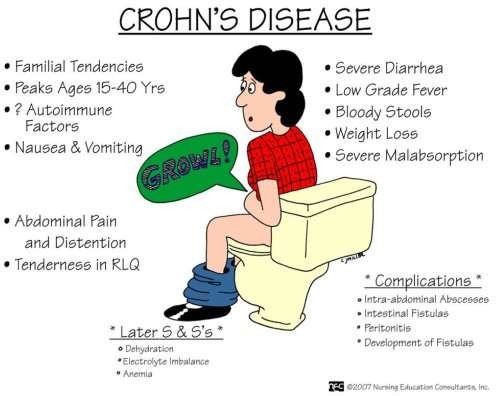A client with Crohn's disease is preparing for discharge from the hospital following treatment for an exacerbation of diarrhea, abdominal pain, and rectal bleeding. Which dietary recommendation(s) should the nurse discuss with the client? (Select all that apply.)
Drink dairy and effervescent sodas for hydration.
Avoid eating fried, fatty foods and large meals.
Enjoy fast food restaurants only if dining with friends.
Limit high fiber foods, such as beans, popcorn, seeds.
Take a vitamin supplement daily with a meal.
Correct Answer : B,D,E
The nurse should discuss the following dietary recommendations with the client who has Crohn's disease:
Avoid eating fried, fatty foods and large meals: Fried and fatty foods can be difficult to digest and may worsen symptoms of diarrhea and abdominal pain. Consuming large meals can also put additional strain on the digestive system.
Limit high fiber foods, such as beans, popcorn, and seeds: High fiber foods can be challenging to digest and may exacerbate symptoms of Crohn's disease. Limiting these foods can help reduce gastrointestinal irritation and promote symptom relief.
Take a vitamin supplement daily with a meal: Crohn's disease can lead to nutrient deficiencies due to malabsorption. Taking a daily vitamin supplement with a meal can help ensure that the client receives essential nutrients and maintain overall nutritional status.
The following options are not appropriate dietary recommendations for a client with Crohn's disease:
- Drinking dairy and effervescent sodas for hydration: Dairy products can trigger symptoms in some individuals with Crohn's disease, especially if they have lactose intolerance. Effervescent sodas may contain carbonation and artificial sweeteners that can aggravate symptoms. Encouraging non-dairy sources of hydration, such as water or herbal teas, would be more appropriate.
- Enjoying fast food restaurants only if dining with friends: Fast food options are generally high in fat, sodium, and other additives that may worsen symptoms in individuals with Crohn's disease. It is advisable to limit or avoid fast food consumption altogether, regardless of whether dining alone or with others.

Nursing Test Bank
Naxlex Comprehensive Predictor Exams
Related Questions
Correct Answer is C
Explanation
Choice C rationale:
Avoiding consuming foods containing chocolate is important for individuals with gastroesophageal reflux disease (GERD) Chocolate contains substances that can relax the lower esophageal sphincter, allowing stomach acid to flow back into the esophagus, worsening GERD symptoms. Therefore, the nurse should include this information in the discharge teaching to help the client manage GERD effectively.
Choice A rationale:
Taking antacids that contain mint for heartburn is not recommended. Mint can relax the lower esophageal sphincter, similar to chocolate, potentially worsening GERD symptoms. Therefore, clients with GERD should avoid mint-containing products.
Choice B rationale:
Increasing dietary intake of citrus fruits is not advisable for individuals with GERD. Citrus fruits are acidic and can irritate the esophagus, leading to increased reflux symptoms. Clients with GERD should limit or avoid citrus fruits in their diet.
Choice D rationale:
Lying down for 30 minutes after eating a meal is not a recommended practice for individuals with GERD. Instead, clients with GERD should remain upright for at least 2-3 hours after eating to reduce the risk of reflux. Lying down shortly after a meal can worsen symptoms by allowing stomach acid to flow back into the esophagus more easily.
Correct Answer is B
Explanation
Choice A rationale:
Looping the tubing so that it is lower than the collection bag creates a dependent loop where urine can pool, increasing the risk of UTI. This practice should be avoided as it can lead to bacterial contamination and subsequent infections.
Choice B rationale:
Keeping the urinary bag at bladder level when ambulating helps maintain a continuous flow of urine into the collection bag without creating dependent loops. This practice minimizes the risk of bacterial contamination and reduces the chances of acquiring a UTI.
Choice C rationale:
Obtaining urinary samples by disconnecting the tubing connections is not recommended. This procedure can introduce bacteria into the urinary system, increasing the risk of UTI. Sterile techniques, such as using a catheter port for sampling, should be followed to minimize the risk of infection.
Choice D rationale:
Securing the catheter to the client's thigh is essential to prevent tension and pulling on the catheter, which can cause trauma to the urethra. However, securing the catheter alone does not minimize the risk of UTI. Proper hygiene, closed drainage system, and maintaining a continuous flow of urine into the collection bag are key factors in preventing UTIs in clients with indwelling urinary catheters.
Whether you are a student looking to ace your exams or a practicing nurse seeking to enhance your expertise , our nursing education contents will empower you with the confidence and competence to make a difference in the lives of patients and become a respected leader in the healthcare field.
Visit Naxlex, invest in your future and unlock endless possibilities with our unparalleled nursing education contents today
Report Wrong Answer on the Current Question
Do you disagree with the answer? If yes, what is your expected answer? Explain.
Kindly be descriptive with the issue you are facing.
